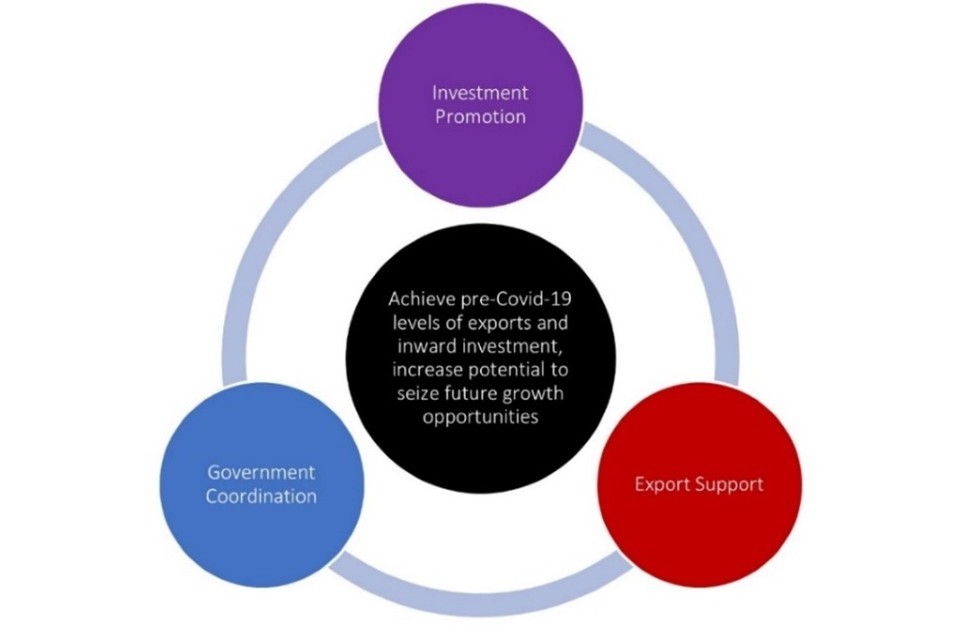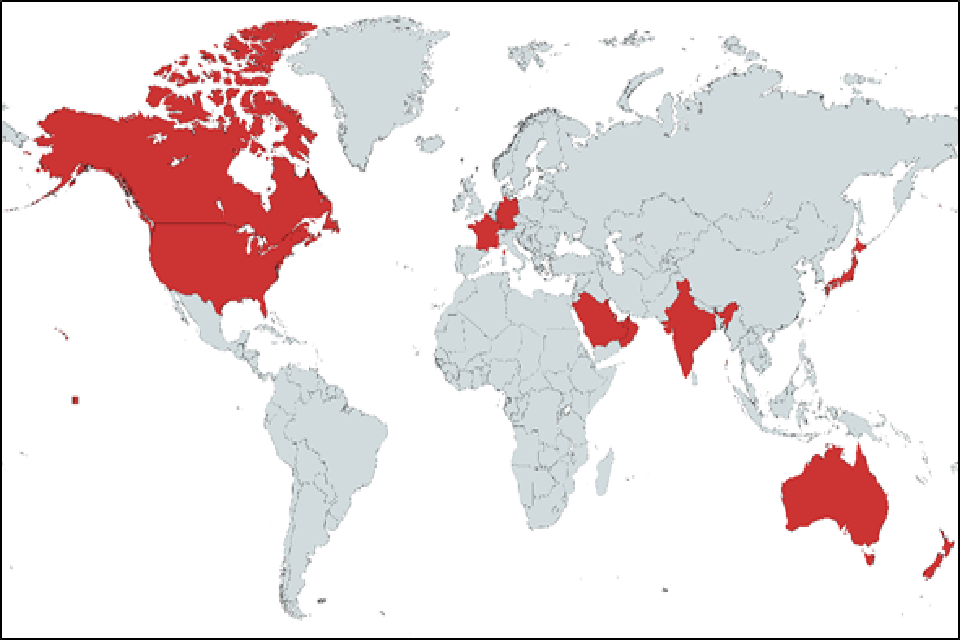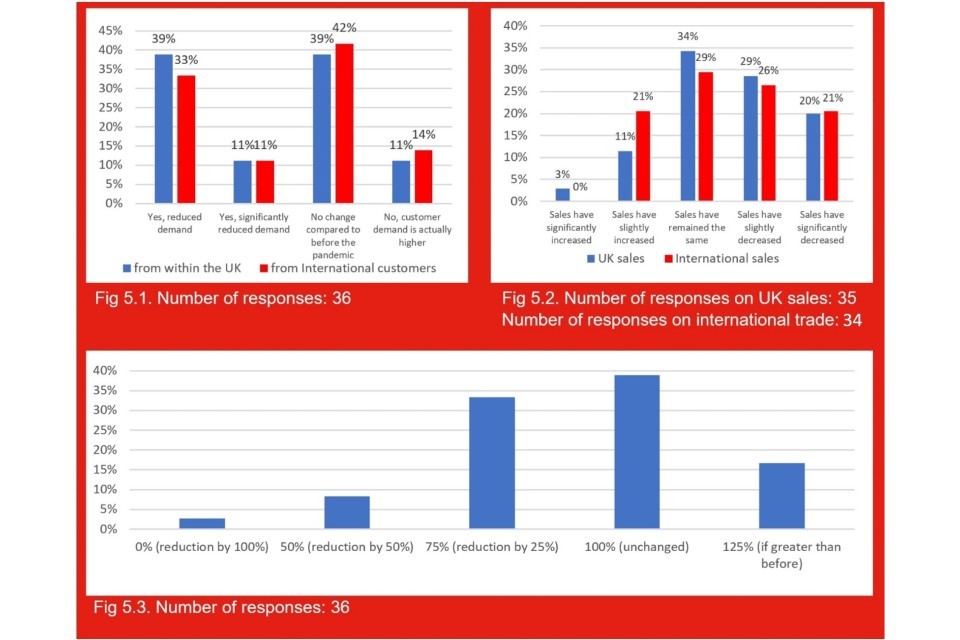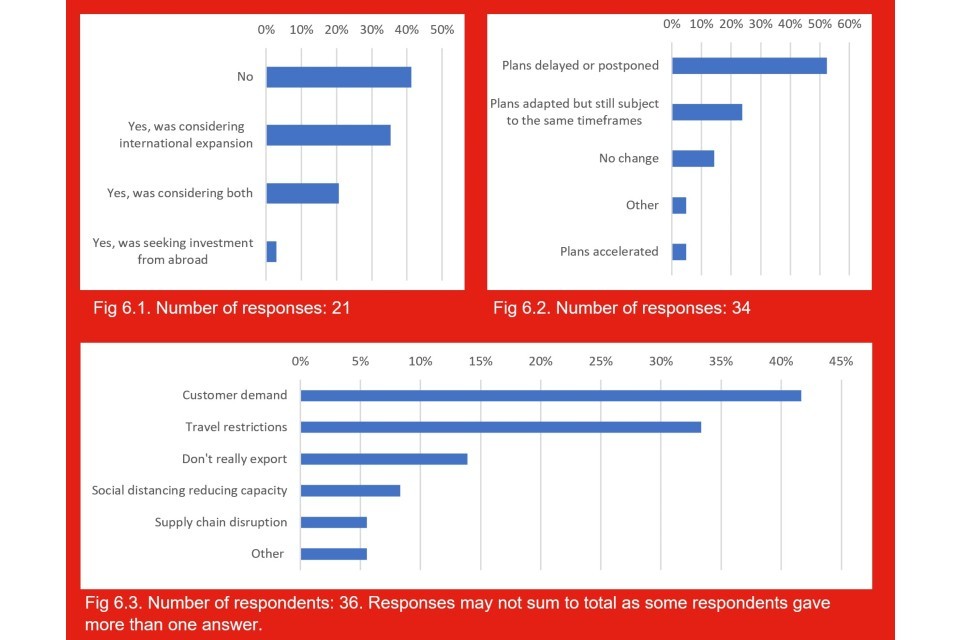Space Sector COVID Support Plan
Published 25 February 2021
Foreword
The impact of the COVID-19 pandemic has been hard felt across our economy and in communities around the United Kingdom. Despite a high degree of resilience expected from our critical national infrastructure, the UK space sector has been no exception. Exports and inward investment in particular, key elements of the sector’s success, are especially important to address as we build back better from COVID-19.
The Prime Minister is clear that he wants the UK space sector to thrive and grow internationally. It is a key enabler of our wider economy, underpinning many of the services we take for granted and increasingly pivotal to developing solutions to some of the greatest global challenges including climate change, future mobility, and tackling COVID-19. All parts of the space economy offer opportunities to level up across the whole of the UK, stimulating new centres of excellence and creating highly skilled, high value jobs.
Developed using feedback and input from the sector, this Space Sector COVID Support Plan is a testament to cross-government working, and I am grateful to all government departments involved. We are committed to ensuring the sector emerges from COVID-19 open, internationally competitive, and focused.
As an independent trading nation, we are taking our place on the global stage, championing the benefits of free trade, lowering market barriers, and building new and exciting international partnerships. I want the UK space sector to bounce back stronger than ever, benefitting from but also contributing to our new global trading outlook post-COVID-19 as we await a new National Space Strategy.
The Space Sector COVID Support Plan will complement actions already being taken by business and I hope will catalyse further investment and innovation in the UK space ecosystem. As a passionate advocate for the UK space sector across the world, I look forward to working with the sector to accelerate the recovery from COVID-19 and return to growth.
Graham Stuart MP
Minister for Exports
Department for International Trade
1. COVID-19 impact on the sector
From data gathered at the height of the pandemic in 2020, it is clear that coronavirus (COVID-19) has had a significant impact on sectors across the UK economy. The space sector has weathered the worst of the COVID-19 pandemic, but even so, demand for UK space exports and foreign direct investment has fallen. As a sector which relies on exports for over a third of its income,[footnote 1] the future commercial success of the UK’s space industry needs additional support. This will help it build back better and enter a new era of UK space ambition.
Exports
Almost half [47%] of companies have seen a reduction or significant reduction in international demand for their products or services.[footnote 2]
Investment
More than half [52%] of companies have postponed or abandoned plans to expand overseas or seek international investors.[footnote 3]
UK companies and their supply chains have been able to accommodate business and travel restrictions with minimal disruption to manufacturing and production output. However, 44% of companies reported operating below one-hundred percent capacity for significant periods during 2020.[footnote 4] Annex A shares the responses from the Monthly Space Sector COVID-19 Impact and Recovery Survey from August 2020.
2. Rationale
COVID-19 has made it harder for businesses to export and invest due to restrictions on travel, the cancellation of trade shows and missions, and a lack of information on overseas market opportunities. Some of these effects are likely to be temporary, such as restrictions on travel. However, a level of uncertainty will persist globally as countries respond to new surges in the virus and recover at different rates and in different ways.
Our Space Sector COVID Support Plan (SSCSP) sets out how the Department for International Trade (DIT) will support the space sector to recover from COVID-19. It sets out the steps towards a more co-ordinated commercial approach to the space sector, which establishes local growth and knowledge sharing initiatives, and harnesses international relationships to benefit the sector’s export and investment opportunities. In doing so, it will support the UK’s wider economic recovery.
DIT has and continues to work across HM Government to develop this Space Sector COVID Support Plan to help the space sector to build back better from the impact of COVID-19.
It works with:
- UK Space Agency (UKSA)
- Department for Business, Energy, and Industrial Strategy (BEIS)
- Foreign, Commonwealth, and Development Office (FCDO)
- Ministry of Defence (MOD)
- Cabinet Office (CO)
These core space departments will improve their cross-government working, share resources and intelligence better, and action specific short-term interventions at a regional and national level to address the key commercial issues that have arisen from the COVID-19 pandemic.
The interventions in this plan have been informed by input and requirements from the sector on what short-term actions can best support the sector’s bounce back. This will lay the foundations for future growth and ambition that will be led by the National Space Council through a long-term UK National Space Strategy.
3. Objectives
The SSCSP is focused on supporting the sector to build back better from the impact of COVID-19. Our plan constitutes 5 core objectives:
A. Develop under-represented regions across the country through local growth initiatives to achieve the levelling up agenda and strengthening of the Union.
B. Set up a space sector-specific Export Academy to build an educational foundation of international trade, investment skills, and knowledge amongst SME space businesses.
C. Create new promotional material to best present the UK space sector to a global audience and attract inward investment.
D. Establish structures across government to represent UK interests in the space sector and to effectively coordinate international engagement strategies.
E. Communicate and consult with industry on policy and regulation to inform the government’s decision-making and policy reform.
These will be achieved through 3 distinct pillars of delivery, summarised in the proposed interventions.
4. Proposed interventions
The mission is to boost prosperity and industrial capability across the whole of the UK by delivering an increase in space exports and targeted inward investment. We have developed a series of interventions required to achieve this, across:

We will do this by:
-
promoting the UK’s space strengths internationally through structured government branding
-
recognising and developing regional talent through targeted local support structures and resources
-
identifying and eliminating barriers to trade and investment that put UK companies at a disadvantage
-
improving methodology and processes for cross-government working to improve policymaking and market access
Below summarises the interventions, with further detail beyond.
Summary of Interventions
Pillar: government coordination
Deliverables are:
-
re-affirm alignment of international commercial objectives and resources of DIT, BEIS/UKSA, FCDO and MOD to realise greater commercial opportunities in support of COVID-19 recovery
-
seek to better understand the impacts of the UK’s current export controls regime, the impacts of international regulations on the sector’s overseas market engagement, and trade barriers in individual markets
-
revitalise cross-government co-ordination mechanisms, working with local partners to reduce trade barriers and support international partnerships to generate commercial opportunities and aid recovery from COVID-19
-
improve focus of government space activity through new governance and delivery approaches
Pillar: export support
Deliverables are:
- launch the Space Sector Export Academy to upskill space SMEs
Pillar: investment promotion
Deliverables are:
-
relaunch of the Leicester Space Park HPO (High Potential Opportunity), building on existing progress and success in attracting inward investment
-
develop geographically diverse space ecosystems to build a sustained UK-wide network, to drive increased prosperity across the whole of the United Kingdom
-
use GREAT branding to build a suite of new space-specific marketing material
4.1 Intervention pillar: government coordination
The government recognises the positive impact of a co-ordinated sector approach on support for UK industry overseas. It will ensure greater effectiveness of our support to the sector to bounce back from COVID-19 and to achieve our collective commercial ambitions for the UK space sector in the future.
By aligning objectives and resources, HMG will unlock greater commercial outcomes for the space sector, and through a unified focus, there will be greater efficiency in tackling market and trade barriers. The improved alignment will ensure that cross-government co-ordination mechanisms are sustainable, both for stimulating and supporting international partnerships, and for industry-facing communication and intelligence-gathering. By working with industry, HMG will deliver better informed policymaking in areas of critical importance for exports, such as informing our export controls regime.
The pillar will help to prepare HMG and the sector for alignment to the further ambitions that will be set out in the National Space Strategy.
1) Re-affirm alignment of international objectives and resources of DIT, BEIS / UKSA, FCDO, and MOD to realise greater commercial opportunities for COVID-19 recovery.
The importance of engaging our international stakeholders with a one-government voice is only growing as the commercialisation of space accelerates. DIT (including UK Defence and Security Exports), BEIS (including UKSA), FCDO, and MOD will align approaches and share a collective set of international priority markets and stakeholders that will support us in realising new commercial opportunities.
HMG will help identify commercial opportunities overseas while longer-term sustained cooperation will be prioritised in:
- the United States, Canada
- Australia, New Zealand, Japan, and Singapore
- India
- France and Germany
- the Gulf Cooperation Council (GCC)
These markets have been selected based on strategic government priorities (India, GCC, Australia, New Zealand, and Singapore) and the potential for future growth. The US, France, Japan, India, and Germany have the largest civil space R&D budgets as a share of GDP[footnote 5] which brings inherent opportunities to commercialise new innovations, in which the UK can play a key role.
HMG will draw on collective resources to better gather and communicate information about the commercial opportunities for the UK space sector. This means working across both civil and defence space interests to better consider challenges in working overseas, as well as understanding where one aspect of the relationship can be leveraged to the benefit of the other.
DIT’s overseas teams (including UK DSE), FCDO, and MOD posts will collate local evidence and expertise. They will work together with UK-based colleagues to support market intelligence gathering and capability building that will cover more of the sector collectively than ever before.
Figure 1: map indicating priority markets for HMG commercial space activity

We can look forward to the National Space Strategy further setting out our long-term approach to international space relations more widely, but we should start to prepare for our future commercial success now as we look to recover from COVID-19. In particular, this means looking at how HMG can work with new and established markets to better build industrial capacity in support of our future space capability priorities but also begin to identify the best long-term export prospects.
The SSCSP will enhance our ability to speak on the international stage with a more coherent voice, work with our partners to better leverage the different aspects of our space relationship in support of our commercial interests, and engage new and exciting markets emerging around the world.
2) Seek to understand better the impacts of the UK’s current export controls regime, the impacts of international regulations on the sector’s engagement with overseas markets, and trade barriers in individual markets.
To help us build back better from COVID-19 and prepare the sector for new export opportunities in the future, we will launch a new consultation. This will appraise the impact of the UK’s export controls on the space sector, which has grown and evolved rapidly in a relatively short period of time. We know that UK space exporters have been heavily impacted by COVID-19, so ensuring that the UK’s strategic export control system is appropriate is key to reinvigorating space exports. The Export Control Joint Unit (ECJU) will assess the results of the consultation and consider improvements or changes to export controls and licensing if appropriate.
We will additionally consult the sector on the impact of international regulatory regimes on their commercial engagement with overseas partners and markets. This will inform the regulatory diplomacy being led at the United Nations by the FCDO and help to shape HMG’s future strategy on the most critical international space issues.
The UN, its Office for Outer Space Affairs (UNOOSA), and Committee on the Peaceful Uses of Outer Space are fundamental to the regulatory approach of the UK and will be increasingly key to our commercial success in the future. The 2020 Outcome Report for the Space Economy Initiative by UNOOSA, published in January 2021, highlights the need for greater engagement and partnership between government and industry to inform the production of clear space strategies for a stronger space economy.
Through DIT and UKSA’s co-chairing of the Space Growth Partnership’s Trade and Export Group (TEG) with UKspace, we will also ensure trade barriers in key markets identified by the UK space sector are captured through a new space trade barriers log. This will be held by the TEG and regularly updated, helping to feed into DIT’s existing trade barriers service. The information provided will be used to build evidence for HMG to devise strategies to overcome space-specific barriers to trade and engage with international governments to strengthen commercial opportunities, while still accounting for national security or geopolitical realities.
3) Revitalise cross-government coordination mechanisms, working with local partners to reduce trade barriers and support international partnerships to generate commercial opportunities and aid recovery from COVID-19.
We have adopted a co-ordinated model of HM Government engagement for India, with HM Trade Commissioner for South Asia convening a cross-government coordination group across DIT, BEIS / UKSA, FCDO, and MOD both in the UK and in country. This model has proven effective at unifying our messages, opportunities, and challenges in the Indian market. The model has already shown improvement for the UK-India commercial and scientific space relationship while accounting for the diplomatic and security interests between our 2 nations.
In preparation for the National Space Strategy, we will scope the replicability of this model of improved HMG alignment on space for the following priority markets:
- Japan
- Canada
- GCC
This scoping will also help us to understand the opportunities of pursuing future space bridges, building on the momentum and buy-in already secured for the UK-Australia Space Bridge. This new partnership will have its own cross-government and intergovernmental structures to support its implementation. We will monitor the success of the UK-Australia Space Bridge, learn lessons, and consider how this model may be applicable to future partners.
4) Improved focus of government space activity through changes needed now and in the future.
This government is united in its determination to establish itself as a global space power, seize the economic opportunities on offer, and create high-skilled jobs across the country. In light of this ambition and the increasing role of space in our lives, economy, and government, BEIS will oversee responsibility for strategy and high-level policy.
This will provide stronger central government coordination of the UK’s first ever National Space Strategy, which will bring long-term strategic and commercial benefits to the UK. UKSA will continue to lead major programmes to support the first UK space launches, pioneer satellite innovation, foster space hubs across the country, and play a key role in supporting BEIS for overall strategy.
DIT will reinvigorate its support for BEIS and UKSA in realising commercial space opportunities through exports, inward investment, and helping the sector to build back better from COVID-19.
4.2. Intervention pillar: export support
DIT recognises the need for greater knowledge-sharing capabilities in order to improve the accessibility of international markets. This is particularly important for SMEs, which account for 30%[footnote 6] of businesses in the sector, to improve trade resilience and build international networks. By hosting a space sector-specific Export Academy, DIT will work with industry partners to unlock the potential and build the confidence of SMEs in the sector to export, aiding in the recovery from COVID-19, and beginning to build commercial resilience for the future.
5) SME support to be increased through the Space Sector Export Academy. This will provide skills and knowledge sharing with industry partners to improve commercial resilience amongst SMEs.
The Export Academy provided by DIT is designed to help SMEs grow their business by providing educational insight for how to export to new customers around the world. This principle is now being applied with a sector-specific focus as part of the SSCSP to support space SMEs nationwide in unlocking their export potential.
The Space Sector Export Academy will be a learning programme that will offer a cohort of SMEs insight into a particular region and sub-sectors which have high export potential for the UK space sector. Workshops will be delivered with industry partners to improve the cohort’s skills and knowledge for how to engage locally and secure trade opportunities. It will address market access barriers, policy and regulation, legal and finance issues, and best practice tips from uncovering leads through to securing the deal.
The academy’s first cohort will run in 2021 and conclude with a DIT-led meet the buyer event in the region of focus to provide an opportunity for the cohort of SMEs to apply their learning and secure new export opportunities. This learning opportunity for SMEs will enhance the sector’s commercial resilience and encourage greater international collaboration.
4.3. Intervention pillar: investment promotion
Local regions and Devolved Administrations need greater support from HMG to develop and promote their opportunities for business growth.
HMG will launch new international promotional material highlighting regional investment prospects for high potential areas as well as national strengths. HMG will join up with local partners to improve infrastructure and accessibility for skilled individuals and organisations to stimulate local clusters and improve access to a national space network. This is key for stimulating foreign direct investment into under-represented areas, and comprehensively representing the UK to international organisations as a leader in the space sector. This can deliver high-value job creation across the country to build back better and diversify the UK’s supply chain’s customer base.
6) Relaunch of the HPO at Space Park Leicester to incorporate changes in the region since launch in spring 2019. Scope further investment propositions to encapsulate the full breadth of UK strengths, and reinforce UK space capabilities.
DIT’s HPO scheme identifies opportunities to attract foreign direct investment into emerging sectors, regions, and clusters – creating new jobs and growth. The Space Park Leicester HPO was identified for the space sector to raise awareness of the prospects in Leicester for overseas companies considering expanding in the UK. Since the HPO was launched in Spring 2019, some changes have been implemented regionally. The HPO relaunch will capture the latest updates and highlight the benefits of FDI into the local area.
DIT will scope the prospects for further space HPO propositions in other regions across the UK, potentially drawing on resources available from UKSA to expedite the process.
7) Develop geographically diverse space ecosystems by identifying regional potential and growing local talent and infrastructure, leading to a sustained UK-wide network. Achieved through the UK Space Agency-led initiative for local space cluster development and DIT’s International Trade Adviser and Investment Services Team regional networks.
UKSA, in partnership with DIT, the Satellite Applications Catapult, Space Growth Partnership, and local partners, are leading on growing the space sector across the country, by supporting businesses and academia to form space clusters. This workstream began in the form of the space hubs announcement made in November 2020 and is continuing to grow.
The local space cluster development programme will build the local capacity, expertise, and networks needed to scale up and take full advantage of space as a growth opportunity. Targeted space business support will improve nationwide sector connectivity, and targeted growth will contribute to growing the UK’s core space capabilities and priority areas.
DIT has regional networks of International Trade Advisers and the Investment Services Team to work directly with businesses on a one-to-one basis to support their export and investment needs as they recover from the impact of COVID-19.
8) DIT will use GREAT branding to develop a suite of new marketing materials that will be used for a global space campaign under the main Ready to Trade campaign activity to showcase the space sector internationally.
The GREAT campaign is a globally recognised brand, highlighting key UK strengths and values. Space assets are currently under-developed and under-utilised in communication planning and delivery. Developing space content under GREAT branding will improve the profile of the UK space sector globally and promote key UK space leadership and strengths internationally.
Cross-government strategic communication teams will be established to align messaging and communication objectives, subsequently raising the profile of the space sector through targeted external messaging which complements wider strategic messaging. This coordinated approach to strategic communications will ensure the UK offer to international buyers and investors is clearly understood.
5. Summary
COVID-19 has undoubtedly had far-reaching consequences for our society, economy, and how we work, live, and engage in the global community. The government has already taken steps to address these and to support UK businesses through the worst of the crisis. It is committed to doing all that it can to accelerate the space sector’s recovery and fulfil our shared ambitions for international growth.
The Space Sector COVID Support Plan is our commitment to support the space sector to recover and build back better from COVID-19.
Annex A
COVID-19 impact dashboard August 2020[footnote 7]

The figure 5.1 bar chart shows customer demand compared to before the pandemic (% of respondents). Demand from customers within the UK was reduced for 50%, remained the same for 39% and increased for 11% of respondents. Demand from international customers was reduced for 44%, remained the same for 42% and increased for 14% of respondents.
The figure 5.2: bar chart shows impact on sales. UK sales had increased for 14%, remained the same for 34% and decreased for 49% of respondents. International sales had increased for 21%, stayed the same for 29%, and decreased for 47% of respondents.
The figure 5.3: bar chart shows operating capacity now compared with immediately before the pandemic (% of respondents). Capacity was reduced to 0% for 3% of respondents. Reduced to 50% for 8% of respondents. Reduced to 75% for 33% of respondents. Unchanged (100%) for 39% of respondents. Increased by 25% for 17% of respondents.
Trade dashboard August 2020[footnote 7]

The bar chart labelled figure 6.1 shows businesses considering international expansion or seeking investment from abroad to grow in 2020 prior to the pandemic. 41% of respondents answered ‘no’. 35% answered ‘yes, was considering international expansion’. 3% answered ‘yes, was seeking investment from abroad’. 21% answered ‘yes, was considering both’.
The bar chart labelled figure 6.2 shows businesses whose plan for international expansion has been affected by the pandemic. 52% answered ‘plans delayed or postponed’. 24% answered ‘plans adapted but still subject to the same timeframes’. 14% answered ‘no change’. 5% answered ‘other’. 5% answered ‘plans accelerated’.
The bar chart labelled figure 6.3 shows the main causes where exports affected by the pandemic. 42% answered ‘customer demand’. 33% answered ‘travel restrictions’. 14% answered ‘don’t really export’. 8% answered ‘social distancing reducing capacity’. 6% answered ‘supply chain disruption’. 6% answered ‘other’.
-
UKSA, Monthly Space Sector COVID-19 Impact and Recovery Survey, August 2020. ↩
-
UKSA, Monthly Space Sector COVID-19 Impact and Recovery Survey, August 2020. ↩
-
UKSA, Monthly Space Sector COVID-19 Impact and Recovery Survey, August 2020. ↩
-
OECD, The ongoing transformation of the global space sector. In: The Space Economy in Figures, 2019. ↩
-
UKSA, Size and Health of the UK Space Industry 2018, table 34. ↩
-
UKSA, Monthly Space Sector COVID-19 Impact and Recovery Survey, August 2020. Shares have been calculated using the total number of responses per question. Not applicable responses have not been included. ↩ ↩2
